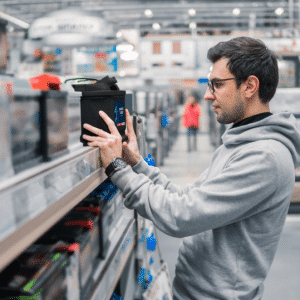
Many vehicles include a second battery to use as an auxiliary power source.
Do you know how many batteries your car has? That’s not a trick question. It might be surprising to learn that quite a few popular vehicles have two batteries, and some may even have three or more auxiliary batteries. As the number of computerized features and electronic conveniences in vehicles continues to expand, the number of batteries required to support them will increase as well.
Multiple batteries can be found in gas/electric hybrid vehicles such as the Toyota Prius and plug-in electric vehicles like Teslas. European makes and electric vehicles are not the sole domain of multiple battery systems as many American automakers also utilize these systems.
Why does my vehicle need more than one battery?
There are two primary functions that may dictate whether a vehicle will have more than one battery.
Larger engines, especially those found in diesel trucks, may need additional cranking power to start the engine. Auxiliary batteries have been commonly used for this application for several years.
With so many modern vehicle systems relying on computers, vehicle manufacturers may include a second battery to use as an auxiliary power source if the main battery fails. This backup power source ensures that data is preserved for a variety of functions. Some are as simple as radio presets, to engine management functions that are optimized through computer learning and the way that the vehicle is driven.
Additionally, modern vehicles have many features that are working in the background even when the car is not running. Climate control now has fans that stay on to cool the computerized components in the dash for 15-20 minutes after a vehicle has stopped. Tailgate sensors that open the rear hatch when triggered require continuous power to be available to the user at any time. The auxiliary battery allows those systems and more to operate properly.
My car has more than one battery, how do I know which one needs to be replaced?
It can be tricky to determine if a problem exists involving the auxiliary battery. In many cases, the need to replace the auxiliary battery is not readily apparent. For example, the vehicle may begin having issues with its lane departure warnings. A warning message might direct the driver to check the charging system.
Even if the auxiliary battery is failing, the vehicle might still start, thanks to the main battery, so the driver logically assumes there is no problem with the battery. A vehicle’s monitoring system will not explicitly tell the driver that the auxiliary battery needs to be replaced.
Are all of these batteries the same?
While the main battery is a standard automotive size, the auxiliary battery can range in size. It may be a standard automotive starting battery in the case of a diesel truck to a battery as small as a deck of cards in a European sedan.
Although the internet has vehicle owners’ forums and other resources that can help determine which battery a vehicle may require, many automotive parts retailers, automotive service providers and new car dealerships have the training and expertise to help diagnose issues and guide consumers in the battery selection process.
So next time you are asked how many batteries does your car have, you will have the knowledge to know the answer. It is important for drivers to know whether their vehicles have one or more batteries, so they can identify problems and maintain their cars at optimum performance levels. If the vehicle starts to have a problem that is not easily diagnosed, it might be time to check both batteries before choosing an expensive alternative. The problem could be as simple as replacing a tiny battery in the dashboard.
Learn more about Stryten Energy transportation batteries.
Lee Wilson, Product Manager, Transportation







